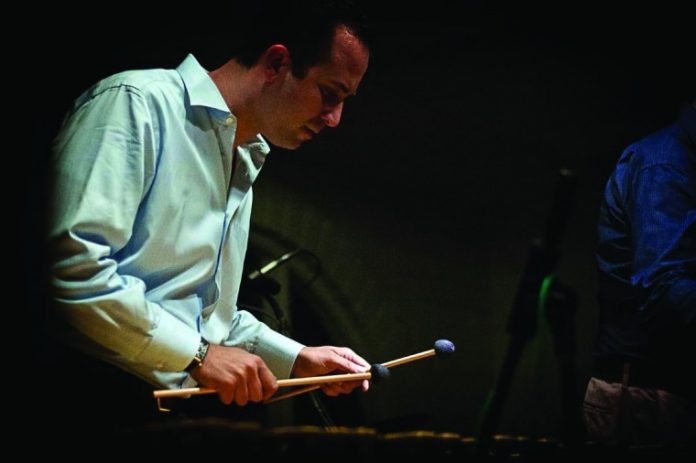Apparently, fatal electrocution is a job hazard for some musicians. Namely if they’re performing with electronic instruments in a run-down gym – with gaping holes in the roof and on an uncomfortably hot, rainy day. And, in Paraguay, of all places, for none other than the legendary Latin vocalist Julio Iglesias.
For 32-year-old Morgan Hill resident and vibraphone phenom Christian Tamburr, it was just another day on the job.
One of the more dangerous ones, but no less memorable than his three-year stint as a pianist at the Las Vegas Bellagio in his early 20s, or his first national tour with a jazz group at the age of 16, or his stint teaching famed magicians Penn and Teller how to play the vibes for their stage show. Since picking up a guitar at the age of 5 – taking after his father, a talented musician in his own right – Tamburr has turned that early prodigious talent into a viable, long-lasting career. His band, the Christian Tamburr Quartet (a sometimes quintet, depending on if they include their part-time trombone player), tours the country, picking up gigs at major jazz venues, celebrity parties and, locally, at the San Pedro Square Market in San Jose earlier this month.
“It’s been a wild ride, a rewarding one … I consider myself very fortunate to have a career in music,” said the Florida transplant, who moved to the South Bay a few years ago after falling in love with a Morgan Hill woman. “It’s different now, having a house, with the yard and everything, a place to come back to and unwind.”
But he’s determined to keep touring, to avoid being typecast as “just another local musician,” he said. Given his background and the tireless work he put into building a national-scale network and brand, he plans to continue performing around the country.
It’s not like he ever considered doing anything else.
“I can’t imagine life without music,” he said. “It’s a way of life. I’m constantly analyzing it, even the music they play in the background at a restaurant. Or at the movie theater – that’s what I focus on, the score, its composition.”
Since he’s sometimes asked to analyze a film’s soundtrack, he can even claim some movie passes as tax write-offs at the end of the year.
“There’s no off switch, though, and that can make it hard to relax at times,” he said. “My wife will remind me if she sees me tapping to the beat of whatever’s playing in the background.”
But it’s a good kind of obsession, he notes, the kind that you need to master something.
A fun obsession
Music has always, from the beginning, been fun for him.
“I picked up the guitar when I was a kid because I saw how much my dad enjoyed it,” he said. “I didn’t play it because I had to.”
By the time he reached school age, that musical mind of his was already well-developed. He joined the school band and picked up percussion. He began to learn the piano, too. In middle school, he signed up for jazz band – a packed class, one with a few percussionists, which meant Tamburr sat out some practice sessions and shows.
“Honestly, I was goofing off, the teacher noticed and suggested I try the vibraphone to keep me busy,” Tamburr recounted. “I’d never even heard of the vibraphone. It was picked for me.”
The vibraphone became his favorite instrument. Vibes are percussive, and have been a mainstay in jazz music for about 80 years since famed jazz musician Lionel Hampton popularized it in the 1930s – it’s said that the famous three-note NBC jingle was first struck by Hampton in studio on the vibes.
“It’s just so unique – it sounds different, visually it’s interesting to look at,” Tamburr said. “It’s the centerpiece of a band. I immediately fell in love with it.”
The instrument initially chosen to keep him from wasting time in class quickly became his favorite one. He mastered it. It turned out to be one more instrument he picked up with ease – music came so naturally to him compared with his peers.
“I knew that right off the bat,” he said. “I knew I had a knack for it. It was never difficult for me.”
So it was little surprise to himself, his family and teachers when he landed a paying job as part of a nationally touring jazz band as a junior in high school. His teachers understandingly granted him enough time off to fulfill his musical pursuits. As the youngest band member by at least a decade, he grew up fast.
“I worked with adults. I traveled. I learned a lot very quickly,” he said. “So by the time I graduated from high school, I already had a huge network of musicians and other industry connections all over the country. I already had an idea of what makes a well-run group, how to manage, just from watching the way people worked with me.”
Never once did he feel like a career in music was out of his reach.
“I was fortunate enough to take classes where we had visiting professionals teach master classes and with teachers who were very supportive and made me realize I could do this for a living,” Tamburr said. “It’s something I try to give back with my own time today.”
When he goes on tour with his group, he’ll make a point sometimes to schedule master classes like the ones he sat through as a kid – set in a public school – to give students hope that they actually could make a living making music. It’s not just some underfunded elective.
But his first priority is the live performance – and to keeping his quartet a national-scale act.
“I think he’s very good at finding a way to put a small tour together or a big tour and takes advantage of the opportunities in whatever area he books us in,” said Greg Wyser-Pratt, the drummer of the quartet and friend of Tamburr, someone he shares a musical kinship with, partly because they’re both percussionists. “We don’t have a lot of down time when we’re on tour, Christian makes sure of that.”
Finding love, and a Morgan Hill home
That ability to self-promote, market and organize the logistical side of things comes a little more easily now that Tamburr found his romantic soulmate, too, he says. His wife met him, by chance, on a flight to San Francisco – she was flying in from a visit with out-of-state family, he back from another Vegas gig. They were worn out from all the traveling, their guards were down – “definitely not your typical first date,” Tamburr recalls.
It was a year after his tour around the world with Julio Iglesias in 2008, when that lightning storm nearly killed him way out somewhere in the tropics. It was 2009, on that plane ride, that me met his wife, Shaina Savastano. Neither had the energy to try to impress each other, per the rules of your typical dating game.
“This was unusual because it was so candid,” he said. “We never thought we’d see each other again.”
Four months later, he moved in with this stranger-on-the-plane-turned-soul mate. He now calls Morgan hill home. Sure, it was a whirlwind romance, maybe a little reckless, but he just knew.
“This was someone I didn’t want to let go,” he said.
It worked out for a number of reasons, the way only a one-in-a-million coupling would have, both personally and professionally for Tamburr as a musician. Firstly, she works for a major software company, often remotely, allowing her to travel with Tamburr. Next, her business-minded bent nicely balances Tamburr’s creative, out-of-the-box inclinations.
“It just works,” Tamburr said. “I’m very happy – I’m in a good place right now.”
With his newfound stability, a newfound headquarters and home studio, he’s looking ahead now – at his future as a young, but experienced, musician and the future of jazz and how to endear it to a new generation of listeners.
“It’s an exciting place to be,” he said, “both personally and professionally.”








